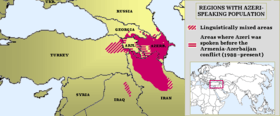Azerbaijani Canadians
Azerbaijani Canadians (Azerbaijani: Kanadalı azərbaycanlılar), or Azeri Canadians, are Canadian citizens and permanent residents of ethnic Azerbaijani background, or those who were born in Azerbaijan. Most Azerbaijani-Canadians have immigrated to Canada from Azerbaijan, Iran, Russia or Turkey.
| Total population | |
|---|---|
| 6,425[1] | |
| Regions with significant populations | |
| Greater Toronto, Vancouver Metropolitan Area and other | |
| Languages | |
| Azerbaijani, Canadian English, French, Russian, Persian, Turkish | |
| Religion | |
| Predominantly Shiite Muslim |
| Part of a series on |
| Azerbaijanis |
|---|
| Culture |
| Traditional areas of settlement |
| Diaspora |
| Religion |
|
| Language |
| Persecution |
|
|
Demographics
According to the Canada 2016 Census, 6,425 Canadians claimed ethnic Azerbaijani background, with nearly two thirds living in Ontario and with more than half living in Toronto.[1] The 2016 census results also mapped the following distribution of Azerbaijani Canadians by province:
| (Source: 2016 Canadian Census) | ||||
3,355 Canadians reported speaking Azerbaijani as a mother tongue,[2] though only 2,730 reported speaking it at home.[3]
History
As of 2016, there were 1,260 Canadians of Azerbaijani origin who were second generation immigrants and only 40 who were third generation or more.[1]
Though immigration from Azerbaijan dates earlier than 1980,[4] ethnic Azerbaijanis were first mentioned in the official census results in 2001. Since then, their numbers have gradually grown, with immigration peaking in 2001–2005.[4]
| Year | Canada's Azeri population |
| 2001[5] | 1,445 |
| 2006[6] | |
| 2011[7] | |
| 2016[1] | |
Notable Azerbaijani Canadians
- Reza Baraheni[8] – prominent scholar and human rights activist
- Ismayil Hajiyev – musician, composer and conductor
- Reza Moridi[9] – Member of the Ontario Provincial Parliament
- Piruz Dilanchi – Azerbaijani separatist leader.
See also
References
- http://www12.statcan.gc.ca/census-recensement/2016/dp-pd/dt-td/Rp-eng.cfm?LANG=E&APATH=3&DETAIL=0&DIM=0&FL=A&FREE=0&GC=0&GID=0&GK=0&GRP=1&PID=110528&PRID=10&PTYPE=109445&S=0&SHOWALL=0&SUB=0&Temporal=2017&THEME=120&VID=0&VNAMEE=&VNAMEF=
- Proportion of mother tongue responses for various regions in Canada, 2016 Census
- Language Spoken at Home (263), Single and Multiple Responses of Language Spoken at Home (3), Mother Tongue (269) and Age (7) for the Population Excluding Institutional Residents of Canada, Provinces and Territories, Census Metropolitan Areas and Census Agglomerations, 2016 Census - 100% Data
- Immigrant population by selected places of birth, admission category and period of immigration, Canada, provinces and territories, census metropolitan areas and areas outside of census metropolitan areas, 2016 Census
- Ethnic Origin (232), Sex (3) and Single and Multiple Responses (3) for Population, for Canada, Provinces, Territories, Census Metropolitan Areas and Census Agglomerations, 2001 Census - 20% Sample Data
- Ethnic Origin (247), Single and Multiple Ethnic Origin Responses (3) and Sex (3) for the Population of Canada, Provinces, Territories, Census Metropolitan Areas and Census Agglomerations, 2006 Census - 20% Sample Data
- "Ethnic Origin (264), Single and Multiple Ethnic Origin Responses (3), Generation Status (4), Age Groups (10) and Sex (3) for the Population in Private Households". Statistics Canada. 2011. Retrieved 13 August 2013. In the 2011 census, 1,985 people indicated 'Azeri'/'Azerbaijani' as a single response and 2,595 as part of multiple origins.
- Baraheni, Reza (2005). "The Midwife of My Land" (PDF). Idea&s Magazine. Faculty of Arts & Science, University of Toronto. 2 (1). Archived from the original (PDF) on April 2, 2012.
- Moridi, Reza (June 25, 2010). "Azerbaijani diaspora in Canada should do much to resist Armenians". News.Az.
